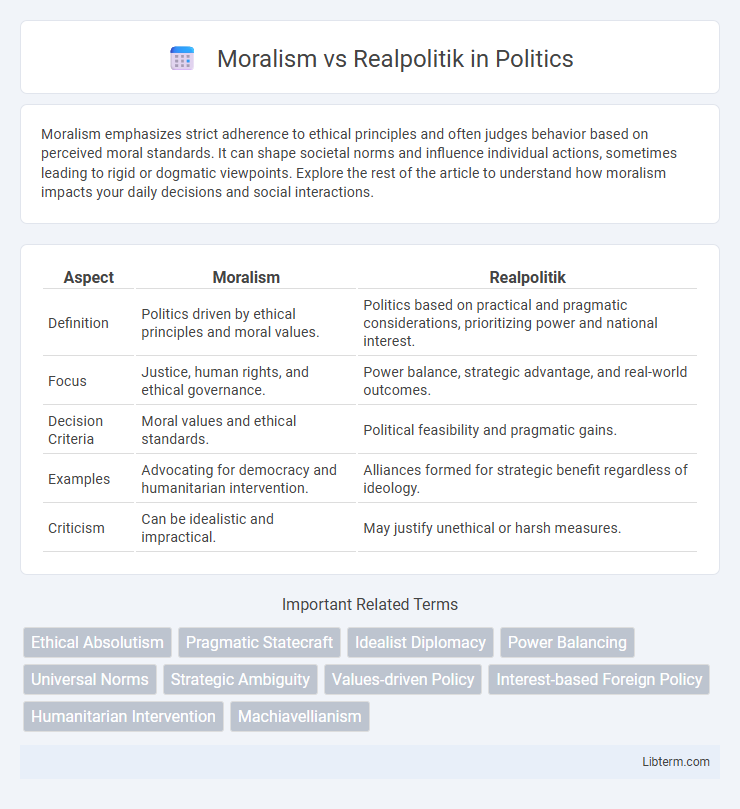Moralism emphasizes strict adherence to ethical principles and often judges behavior based on perceived moral standards. It can shape societal norms and influence individual actions, sometimes leading to rigid or dogmatic viewpoints. Explore the rest of the article to understand how moralism impacts your daily decisions and social interactions.
Table of Comparison
| Aspect | Moralism | Realpolitik |
|---|---|---|
| Definition | Politics driven by ethical principles and moral values. | Politics based on practical and pragmatic considerations, prioritizing power and national interest. |
| Focus | Justice, human rights, and ethical governance. | Power balance, strategic advantage, and real-world outcomes. |
| Decision Criteria | Moral values and ethical standards. | Political feasibility and pragmatic gains. |
| Examples | Advocating for democracy and humanitarian intervention. | Alliances formed for strategic benefit regardless of ideology. |
| Criticism | Can be idealistic and impractical. | May justify unethical or harsh measures. |
Understanding Moralism: Principles and Foundations
Moralism is grounded in ethical principles that emphasize universal values such as justice, human rights, and moral duty, prioritizing what ought to be done regardless of practical consequences. Its foundation rests on philosophical doctrines like deontology and idealism, which advocate for actions aligned with moral correctness above strategic advantage. Understanding moralism requires recognizing its commitment to adherence to ethical norms, often challenging pragmatic policymaking in favor of maintaining moral integrity in political and social decisions.
Realpolitik Defined: Origins and Core Concepts
Realpolitik, rooted in 19th-century European statecraft, emphasizes pragmatic and strategic power politics over ethical considerations or ideological commitments. Originating with thinkers like Otto von Bismarck, it prioritizes national interest and practical outcomes, often employing diplomatic manipulation, military force, or alliances to achieve political objectives. The core concept revolves around objective analysis of power dynamics and the pursuit of stability and security, contrasting sharply with moralism's emphasis on principles and ethical governance.
Historical Contexts: When Moralism Clashed with Realpolitik
Historical contexts reveal numerous clashes between moralism and realpolitik, such as the Cold War, where ideological commitment to democracy and human rights often conflicted with pragmatic alliances with authoritarian regimes. During World War II, Allied powers faced moral dilemmas in forming partnerships of convenience, prioritizing strategic victory over ethical considerations. Similarly, the post-colonial era highlighted tensions as newly independent nations navigated sovereignty and moral principles amid Cold War power struggles and geopolitical realignments.
Key Philosophers and Political Thinkers on Both Sides
Moralism in political philosophy finds support in thinkers like Immanuel Kant, who emphasized duty, universal ethics, and adherence to moral law, advocating principled governance based on justice and human rights. Realpolitik, championed by figures such as Niccolo Machiavelli and Otto von Bismarck, prioritizes pragmatic power dynamics, national interest, and practical strategy over ideological or ethical considerations. The tension between Kantian moral imperatives and Machiavellian realism continues to shape debates on international relations and domestic policy decision-making.
Case Studies: Successful Applications of Moralism
Successful applications of moralism are evident in the international response to apartheid in South Africa, where global sanctions and diplomatic pressure contributed to the regime's dismantling based on human rights principles. The U.S. civil rights movement exemplifies moralism in domestic policy, where nonviolent resistance and appeals to justice led to significant legislative reforms like the Civil Rights Act of 1964. The promotion of humanitarian intervention in Kosovo (1999) demonstrates moralism by prioritizing human rights protection over strict state sovereignty, influencing NATO's decision to intervene against ethnic cleansing.
Realpolitik in Action: Lessons from World Politics
Realpolitik in action emphasizes pragmatic decision-making rooted in national interest and power dynamics, evident in historical events such as Otto von Bismarck's unification of Germany and Richard Nixon's detente with the Soviet Union. This approach prioritizes strategic alliances, military strength, and economic leverage over ideological or moral considerations, often leading to complex diplomatic negotiations and realignments. Lessons from world politics reveal that Realpolitik's success depends on adaptability, calculated risks, and a clear understanding of geopolitical realities.
Ethical Dilemmas: Navigating Between Values and Pragmatism
Moralism emphasizes adherence to ethical principles and universal values when making political decisions, often prioritizing justice and human rights. Realpolitik focuses on practical and strategic considerations, prioritizing national interest and power over moral ideals. Navigating ethical dilemmas requires balancing the integrity of moral values with the necessity for pragmatic actions that ensure state survival and effective governance.
The Impact on International Relations and Diplomacy
Moralism in international relations emphasizes ethical principles, human rights, and justice, often shaping diplomatic efforts through normative frameworks that advocate for global cooperation and adherence to international law. Realpolitik prioritizes pragmatic, power-driven decision-making, focusing on national interests, strategic advantage, and state survival, which can lead to alliances and conflicts based on shifting power dynamics rather than moral considerations. The tension between moralism and realpolitik influences diplomatic negotiations, with states balancing idealistic values against practical realities to shape foreign policy outcomes and global order.
Contemporary Debates: Current Examples of the Tension
Contemporary debates on Moralism vs Realpolitik are exemplified by US-China relations, where human rights concerns clash with strategic economic interests. The European Union faces similar tensions balancing climate change commitments with energy security amid geopolitical conflicts. In the Middle East, international responses to authoritarian regimes highlight the struggle between ethical foreign policy and pragmatic alliances.
Future Outlook: Blending Moralism and Realpolitik in Policy
Future policies increasingly reflect a blend of moralism and realpolitik, recognizing the necessity of ethical principles alongside pragmatic power dynamics. Policymakers advocate for strategies that uphold human rights and justice while navigating geopolitical realities and national interests. This synthesis aims to create sustainable, just solutions that accommodate both idealistic values and practical constraints in global governance.
Moralism Infographic

 libterm.com
libterm.com